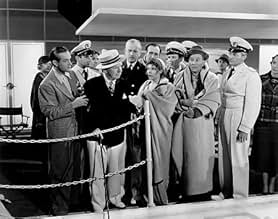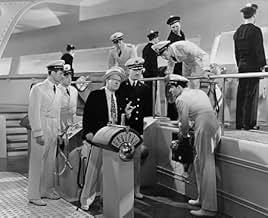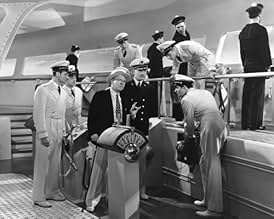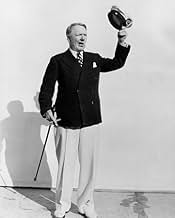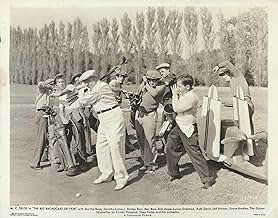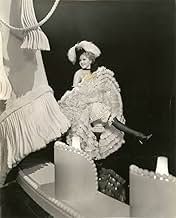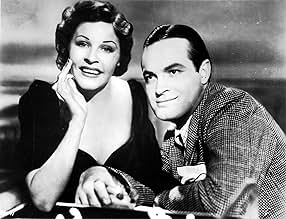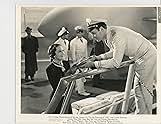VALUTAZIONE IMDb
6,1/10
1146
LA TUA VALUTAZIONE
Aggiungi una trama nella tua linguaThe Bellows family causes comic confusion on an ocean liner, with time out for radio-style musical acts.The Bellows family causes comic confusion on an ocean liner, with time out for radio-style musical acts.The Bellows family causes comic confusion on an ocean liner, with time out for radio-style musical acts.
- Regia
- Sceneggiatura
- Star
- Vincitore di 1 Oscar
- 5 vittorie totali
Leif Erickson
- Bob Hayes
- (as Leif Erikson)
Virginia Vale
- Joan Fielding
- (as Dorothy Howe)
Recensioni in evidenza
The "plot" of this slapdash musical concerns a transatlantic ship race between two new "super-ships", the Gigantic and the Colossal. On board the former, S.B. Bellows (W.C. Fields), the brother of shipping line boss T. Frothingill Bellows (also Fields), tries to ensure that his ship wins, although he spends most of his times in drunken calamities. Also on board is entertainment host Buzz Fielding (Bob Hope), who takes time in between introducing musical acts to rekindle romance with one of his ex-wives (Shirley Ross), while his current girlfriend (Dorothy Lamour) falls for handsome ship radioman Bob (Leif Erickson). Things get even more chaotic when Bellows' daughter Martha (Martha Raye) comes aboard. Also featuring Ben Blue, Grace Bradley, Lynne Overman, Patricia Wilder, Rufe Davis, Lionel Pape, Virginia Hale, James Craig, Richard Denning, Monte Blue, Mae Busch, Leonid Kinskey, Bernard Punsly, and Russell Hicks.
Seemingly assembled from bits of different movies awkwardly stitched together, there's some funny stuff here, but no kind of pacing or interesting narrative. Fields, who was making his final Paramount film here, is funny, and his golf game and billiards game scenes are top notch. Bob Hope, making his feature debut, sings his signature song. I was pleasantly surprised to see future Road co-star Lamour already working with him. Martha Raye gets a rather impressive song and dance number that gets acrobatic and she obviously didn't use a double. The music numbers are an odd lot, too, with a couple of songs by Mexican star Tito Guizar, a performance from Norwegian opera diva Kirsten Flagstad (doing Wagner's "Brunnhilde's Battle Cry"), and Shep Fields and His Rippling Rhythm Orchestra doing "This Little Ripple Had Rhythm" which combines live action with animation to show the "origin" of the "rippling rhythm", which apparently was an ambulatory blob of swamp water that separates from a bog and walks to Fields' band and teaches them. It makes as much sense as it sounds. The movie won the Oscar for Best Song ("Thanks for the Memory").
Seemingly assembled from bits of different movies awkwardly stitched together, there's some funny stuff here, but no kind of pacing or interesting narrative. Fields, who was making his final Paramount film here, is funny, and his golf game and billiards game scenes are top notch. Bob Hope, making his feature debut, sings his signature song. I was pleasantly surprised to see future Road co-star Lamour already working with him. Martha Raye gets a rather impressive song and dance number that gets acrobatic and she obviously didn't use a double. The music numbers are an odd lot, too, with a couple of songs by Mexican star Tito Guizar, a performance from Norwegian opera diva Kirsten Flagstad (doing Wagner's "Brunnhilde's Battle Cry"), and Shep Fields and His Rippling Rhythm Orchestra doing "This Little Ripple Had Rhythm" which combines live action with animation to show the "origin" of the "rippling rhythm", which apparently was an ambulatory blob of swamp water that separates from a bog and walks to Fields' band and teaches them. It makes as much sense as it sounds. The movie won the Oscar for Best Song ("Thanks for the Memory").
THE BIG BROADCAST OF 1938 (Paramount, 1938), directed by Mitchell Leisen, is another one of those "plotless" musicals produced by Paramount in the 1930s, this being the most memorable mainly because it puts two comic legends on screen for the first and only time: W.C. Fields (in his final film for the studio) and Bob Hope as Buzz Fielding (in his feature film debut). Out with the old, in with the new. Yet Fields and Hope share no scenes together, with Hope getting more screen time than Fields (in a dual role playing twin brothers).
The radio broadcast, hosted by Hope himself, is set on an ocean liner during a transatlantic race with another. Memorable moments include W.C. Fields golf game routine, and Shirley Ross as one of Hope's ex-wives sharing her "Thanks for the Memory" with him. "Memory" would become Hope's theme song for the duration of his career, and the Academy Award winning tune of 1938. In spite of her name placed second in the cast, Martha Raye, as Fields' accident prone daughter, arrives late into the story, making the best of her "Oh, boys!" and hi-jinx antics, as well as her song number, "Mama, Oh, Mama." On the lighter side, Dorothy Lamour (who twice sings "You Took the Words Right Out of My Heart") is somewhat wasted with her limited footage as Hope's fiancé who may or may not become Mrs. Fielding No. 4.
Aside from Lynne Overman, Ben Blue, Grace Bradley and Leif Erickson participating in the storyline, the shipboard entertainment consists of special guest appearances from Shep Fields and his Rippling Rhythm Orchestra (singing "This Little Ripple Has Rhythm"); Tito Guizar (singing "Zumi-Zumi" and "Don't Tell a Secret to a Rose") and Kirsten Flagstad (performing Richard Wagner's "Brunnilde's Battle Cry"). With the exception of "Thanks for the Memory," the score by Leo Robin and Ralph Rainger is forgettable. The big broadcast finale, "The Waltz Lives On" (sung by Hope and Ross) is passable, with Raye stepping into this number briefly with her hot jive "Truckin'". It's also interesting during that same number to see Hope dancing with Ross.
The final "Big Broadcast" musical consists of so much talent with little screen time, possibly victims of severe film editing. The theatrical trailer does include of Kirsten Flagstad performing in another opera segment not included in the final print. Although THE BIG BROADCAST OF 1938 can be a disappointment with too little Fields and too many song numbers unrelated to the plot, it somehow gets by.
The musical-comedy did have frequent revivals on the American Movie Classics cable channel from 1995 to 1998. The license to air this was later picked up by Turner Classic Movies where it premiered June 18, 2001, as part of its "Star of the Month" tribute, W.C. Fields. Prior to the start of the movie, host Robert Osborne talked a bit about the this Big Broadcast installment, and the annual musicals that preceded it, starting with the one that launched Bing Crosby in 1932, and the second in the series THE BIG BROADCAST OF 1936. Yet, there was no mention at all about the third, THE BIG BROADCAST OF 1937, as if it never existed, jumping immediately to 1938. While the three "Big Broadcast" musicals are close to being forgotten today, the 1938 edition happens to be the only one of the four available on video cassette and later on DVD, as part of the double feature package with 1938's COLLEGE SWING, also featuring Martha Raye and the legendary Bob Hope. Thanks for the Memories.(***)
The radio broadcast, hosted by Hope himself, is set on an ocean liner during a transatlantic race with another. Memorable moments include W.C. Fields golf game routine, and Shirley Ross as one of Hope's ex-wives sharing her "Thanks for the Memory" with him. "Memory" would become Hope's theme song for the duration of his career, and the Academy Award winning tune of 1938. In spite of her name placed second in the cast, Martha Raye, as Fields' accident prone daughter, arrives late into the story, making the best of her "Oh, boys!" and hi-jinx antics, as well as her song number, "Mama, Oh, Mama." On the lighter side, Dorothy Lamour (who twice sings "You Took the Words Right Out of My Heart") is somewhat wasted with her limited footage as Hope's fiancé who may or may not become Mrs. Fielding No. 4.
Aside from Lynne Overman, Ben Blue, Grace Bradley and Leif Erickson participating in the storyline, the shipboard entertainment consists of special guest appearances from Shep Fields and his Rippling Rhythm Orchestra (singing "This Little Ripple Has Rhythm"); Tito Guizar (singing "Zumi-Zumi" and "Don't Tell a Secret to a Rose") and Kirsten Flagstad (performing Richard Wagner's "Brunnilde's Battle Cry"). With the exception of "Thanks for the Memory," the score by Leo Robin and Ralph Rainger is forgettable. The big broadcast finale, "The Waltz Lives On" (sung by Hope and Ross) is passable, with Raye stepping into this number briefly with her hot jive "Truckin'". It's also interesting during that same number to see Hope dancing with Ross.
The final "Big Broadcast" musical consists of so much talent with little screen time, possibly victims of severe film editing. The theatrical trailer does include of Kirsten Flagstad performing in another opera segment not included in the final print. Although THE BIG BROADCAST OF 1938 can be a disappointment with too little Fields and too many song numbers unrelated to the plot, it somehow gets by.
The musical-comedy did have frequent revivals on the American Movie Classics cable channel from 1995 to 1998. The license to air this was later picked up by Turner Classic Movies where it premiered June 18, 2001, as part of its "Star of the Month" tribute, W.C. Fields. Prior to the start of the movie, host Robert Osborne talked a bit about the this Big Broadcast installment, and the annual musicals that preceded it, starting with the one that launched Bing Crosby in 1932, and the second in the series THE BIG BROADCAST OF 1936. Yet, there was no mention at all about the third, THE BIG BROADCAST OF 1937, as if it never existed, jumping immediately to 1938. While the three "Big Broadcast" musicals are close to being forgotten today, the 1938 edition happens to be the only one of the four available on video cassette and later on DVD, as part of the double feature package with 1938's COLLEGE SWING, also featuring Martha Raye and the legendary Bob Hope. Thanks for the Memories.(***)
7tavm
W.C. Fields and Bob Hope are probably the reasons anyone would still watch The Big Broadcast of 1938
This was my third time in watching this movie when I popped the DVD in just now. It's notable as W.C. Fields' last for Paramount, and Bob Hope's first feature after years of doing shorts. It also marked the first time Hope performed what became his theme song-"Thanks for the Memory"-which, as performed here, was originally a bittersweet ditty of a love that had its ups and downs with Shirley Ross providing a nice share of wit in duetting with Hope in singing it. Fields is funny whether playing golf, pool, or trying to run the ship though I admit I rewinded some of his scenes to try to understand what he's saying! Two future Hope co-stars, Dorothy Lamour and Martha Raye, provide some charms along the way with Ms. Lamour singing a nice romantic ballad and Ms. Raye doing some great comic banter and slapstick. There's also some amusements from Ben Blue and a forgotten lady named Patricia Wilder as a Southern belle doing deadpan shtick. Oh, and an animated sequence produced by Leon Schlesinger though since he was just a money man, it could possibly have been helmed by whoever was the "supervisor" under him at the time like Fred "Tex" Avery, Robert Clampett, or Frank Tashlin. No great shakes but The Big Broadcast of 1938 is worth a look for historical reasons and if you find the people I mentioned entertaining.
I really don't understand what some people expect when they watch an old movie like this. This one in my estimation, is light hearted and entertaining. It is a showcase for some of our greatest stars as they were just starting out. Is it their best effort? Probably not. But it is fun to watch if you don't take it too seriously. I'm awfully glad we have it around to watch. Being a fan of almost every star in it, I consider it a treasure chest of many favorites talent. W.C. Fields is wonderful through out the film. Some of his skits are hilarious! Bob Hope is so good in his role that you have to really feel sorry for his character. Of course the song "Thanks For The Memories" is forever linked to him with this film. Martha Ray is hilarious in another one of her zany roles. All in all, a very good and entertaining film to be watched over and over. A real, or reel part of history.
This movie is very dear to me. I saw it on late-night TV when I was about 12 years old, tape-recorded the sound track and listened to it over and over again. This is a movie that has everything: wacky W. C. Fields bits like his golf and pool routines, Bob Hope bombing out with the crowd on the ship (imagine, in his first movie role he can't even raise a laugh!), bizarre but charming performers like Shep Fields with his Rippling Rhythm orchestra (whom Lawrence Welk obviously ripped off), accompanied by an even more bizarre animated segment.
It's almost like watching a '30s stage revue of really gifted and varied performers, including a Mexican singer so beautiful he must be gay, and Martha Raye doing her foghorn bit. But the crowning glory of this film is the funny and poignant duet, Thanks for the Memory, with Bob Hope and Shirley Ross.
Most people know the tune as Bob's theme song, but few know the clever, tender, almost Dorothy Parker-like lyrics. This is the story of a sophisticated but madcap couple, not unlike Nick and Nora Charles, running through money like water, traveling the world, and finding bliss in bed. Each verse tells a little bit more of their story in an arch, clever way that is never too trite because of Shirley Ross's marvelous acting. Her facial expressions reveal the deeper story underneath the actual events, a couple who were madly in love but stormy and tempestuous, with fights that may have included screaming and hair-pulling.
Shirley makes reference to "the night you came home with lipstick on your tie", making it sound like an uproarious joke, while Bob rolls his eyes in discomfort. He sings of "that weekend in Niagara when we hardly saw the falls," and Ross murmurs, "How lovely that was." "Thank you," Bob replies.
This is a fresh and sensitive take on what could be a very sentimental song, and I can never see it without tearing up at the end. This movie is worth renting or buying, if you can find it, as a great example of '30s entertainment with the bonus of a truly great "love-lost" song.
It's almost like watching a '30s stage revue of really gifted and varied performers, including a Mexican singer so beautiful he must be gay, and Martha Raye doing her foghorn bit. But the crowning glory of this film is the funny and poignant duet, Thanks for the Memory, with Bob Hope and Shirley Ross.
Most people know the tune as Bob's theme song, but few know the clever, tender, almost Dorothy Parker-like lyrics. This is the story of a sophisticated but madcap couple, not unlike Nick and Nora Charles, running through money like water, traveling the world, and finding bliss in bed. Each verse tells a little bit more of their story in an arch, clever way that is never too trite because of Shirley Ross's marvelous acting. Her facial expressions reveal the deeper story underneath the actual events, a couple who were madly in love but stormy and tempestuous, with fights that may have included screaming and hair-pulling.
Shirley makes reference to "the night you came home with lipstick on your tie", making it sound like an uproarious joke, while Bob rolls his eyes in discomfort. He sings of "that weekend in Niagara when we hardly saw the falls," and Ross murmurs, "How lovely that was." "Thank you," Bob replies.
This is a fresh and sensitive take on what could be a very sentimental song, and I can never see it without tearing up at the end. This movie is worth renting or buying, if you can find it, as a great example of '30s entertainment with the bonus of a truly great "love-lost" song.
Lo sapevi?
- BlooperNear the end of the movie the helmsman said that the S.S. Gigantic was diesel powered. That would mean that the liner's proper name would be MV (Motor Vessel) Gigantic as opposed to SS (Stream Ship) Gigantic.
- Citazioni
First reporter: Say, do you know anything about electricity?
S.B. Bellows: My father occupied the chair of applied electricity at State Prison.
- ConnessioniFeatured in Hollywood and the Stars: The Fabulous Musicals (1963)
- Colonne sonoreThis Little Ripple Had Rhythm
(uncredited)
Music by Ralph Rainger
Performed by Shep Fields and His Rippling Rhythm Orchestra
I più visti
Accedi per valutare e creare un elenco di titoli salvati per ottenere consigli personalizzati
- How long is The Big Broadcast of 1938?Powered by Alexa
Dettagli
- Data di uscita
- Paese di origine
- Lingua
- Celebre anche come
- Radioparaden 1938
- Luoghi delle riprese
- Eastern Service Studios, Astoria, Queens, New York, New York, Stati Uniti(sequence: Kirsten Flagstad aria)
- Azienda produttrice
- Vedi altri crediti dell’azienda su IMDbPro
- Tempo di esecuzione
- 1h 31min(91 min)
- Colore
- Proporzioni
- 1.37 : 1
Contribuisci a questa pagina
Suggerisci una modifica o aggiungi i contenuti mancanti

